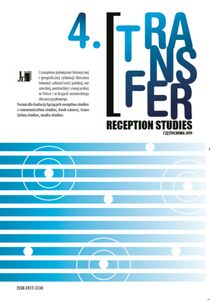Powroty do przeszłości. Po śladach rodzinnych w niemieckojęzycznej literaturze (nie tylko) polskiego pochodzenia
Returning to the Past: Following Family Traces in Contemporary Literature of not only Polish Descent
Author(s): Hans-Christian TrepteSubject(s): Studies of Literature
Published by: Uniwersytet Jana Długosza w Częstochowie
Keywords: (e)migration; German literature; traces; identity; intercultural texts; Jonathan Safran Foer; Katia Petrowska; Eduard Merian; Brygida Helbig; Deborah Feldman;
Summary/Abstract: Returning to ones country of origin belongs to the most important problems of migrant literature. The literary exposure of ‘The East’ of Europe after the democratic breakthrough of 1989-90 were tied to a search for lost places of commemoration and travelling to family vestiges. Examples are the English works of Cracow born Ewa Hoffman, American born Anne Applebaum, or Jonathan Safran Foer. His novel Everything Is Illuminated is a novel book as the narrator – the grandson of the generation of Holocaust victims and survivors – undertakes an effort to explain that which for younger readers is difficult to fathom. New narrative forms regarding the past and the Holocaust emerge from the anxiety of second and third generation Jewish ‘survivors’ trying to trace the fates of family members on the basis of family accounts and stories, official and private histories, and second-hand knowledge. In this way, Katia Petrowska converts the historical family lapses and blank histories into living, recorded words. Searching for the truth, the writer endeavors to travel to family places all over Europe, incorporating the experience into a literary work. Her book, Maybe Ester: A Family Story, transcends – as do other works of this genre – all categories of national literature, traditional definitions of identity, demonstrating one’s own exile and homelessness. Authors such as Eduard Marian appreciate that the silence must be broken, the stories told as long as the survivors still live. Brygida Helbig raises issues associated with her parent’s descent and identity. Her texts possess varied language/cultural vestments as demonstrated in her novel Niebko (2013). The ‘literature of returning’ has emerged in a number of languages, and as such, constitutes as new inter-cultural text. An essential characteristic of these texts is the author’s attitude to a particular culture, to the language community of their parents and grandparents, as well as the country where the writer lives. The debut of the German novel by Deborah Feldman, Überbitten, belongs to the splendid ‘Berlin Literature’, where the author uses her own life and her family’s fate, qualifies the book as ‘post-memorial literature’. In the face of the newest wave(s) of migration, writing of one’s own ordeals and experiences and family history will become a key characteristic of contemporary literature, regardless of an author’s descent.
Journal: Transfer. Reception studies
- Issue Year: 4/2019
- Issue No: 1
- Page Range: 77-91
- Page Count: 15
- Language: Polish

